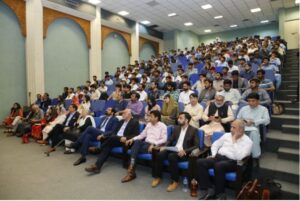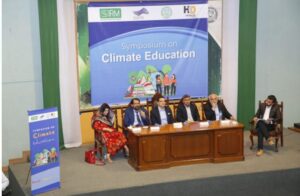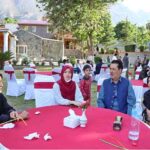ISLAMABAD, May 8 (APP): A Symposium held at the International Islamic University, Islamabad (IIUI) on Wednesday addressed Pakistan’s vulnerability to climate change and the urgent need to educate citizens, especially the youth, on its impact and mitigation strategies.

The Institute of Rural Management (IRM), in collaboration with the Human Resource Development Network (HRDN) and the Rural Support Programme Network (RSPN), hosted a symposium titled ‘Climate Education: Educate, Advocate, and Act’.
The event convened a diverse audience, including government officials, professors, professionals, students, and community members.
It shed light on Pakistan’s vulnerability to the global impact of climate change and the imperative to educate citizens, particularly the youth, about its implications and mitigation strategies.
Esteemed panelists, including Dr. Roomi S. Hayat (CEO, IRM, and Chairperson, IUCN-PNC), Dr. Tariq Cheema (Executive Country Representative of Pakistan and Afghanistan from ALIGHT), Dr. Zafar Iqbal (Dean, Social Sciences Department, IIUI), Dr. Noor Fatima (Chairperson, IR & Political Sciences Department, IIUI), and Dr. Ghulam Ali (Chairman, IBCC, Ministry of Federal Education & Professional Training), engaged in thought-provoking discussion and deliberation and apprised the audience. The event was successfully moderated by Haseeb Khan (Officer Climate & Energy, WWF Pakistan).

Dr. Roomi S. Hayat shared how climate education could be taken to rural and marginalized groups in Pakistan and the significance of making them aware of the threats of climate change to make them well prepared for such changes.
He also mentioned the initiatives by IUCN in this regard and the knowledge products curated and information platforms established to foster climate education and awareness.
Dr. Tariq Cheema from ALIGHT highlighted the significance of mainstreaming climate education in the context of Pakistan.
He said, “Being climate literate is not enough; one must take action at the individual level and be climate conscious.”
Dr. Ghulam Ali represented the government’s stance on climate education. He said, “The government is active in working on various aspects of climate education, which is underway.”
He invited experts on the panel to come forward and contribute to designing climate education material. He also emphasized leveraging technology to foster climate education.
Dr. Noor Fatima and Dr. Zafar Iqbal from IIUI discussed climate education in NDCs developed by Pakistan and how it can be incorporated into existing education curricula at various levels of education.
The symposium provided a critical platform for comprehensive analysis and discourse on the pertinent topic of climate education, and through informative discussion, insightful case studies, and interactive sessions, participants gained valuable perspectives on the profound implications of these interconnected challenges.
Beyond its educational value, the symposium facilitated networking opportunities and knowledge sharing among stakeholders from diverse sectors, fostering collaboration and synergy in addressing shared environmental concerns.
Participants were encouraged to harness their collective expertise and resources to advance holistic approaches toward fostering climate literacy in the wake of current climatic challenges.




